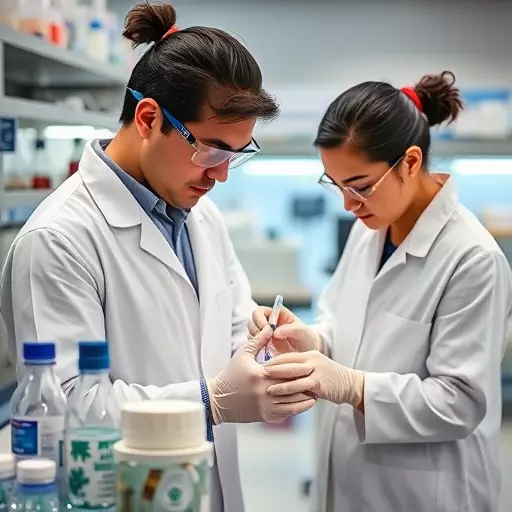Automation is revolutionizing lab work in Lansing-East Lansing, driving efficiency and productivity through technologies like single-cell sequencing and microfluidics. Single-cell sequencing has significantly impacted cancer research, while microfluidic innovations expedite diagnostic processes. These advancements enable more productive research within the region's vibrant scientific community, enhancing capabilities in both research and diagnostics.
In today’s competitive scientific landscape, automation is revolutionizing lab productivity. From streamlining workflows in Lansing-East Lansing to powering advanced technologies like single-cell sequencing and microfluidics, automation offers unparalleled efficiency gains. This article explores these transformative trends, highlighting how they benefit research institutions locally and globally. Discover the impact of automation on lab work, from time and cost savings to enhanced accuracy and accelerated diagnoses.
- Streamlining Lab Workflows: Automation in Lansing-East Lansing
- – Exploring the benefits of automation for efficient lab management
- – Time and cost savings through automated tasks
Streamlining Lab Workflows: Automation in Lansing-East Lansing

In the bustling landscape of lab work in Lansing-East Lansing, automation emerges as a game-changer. By integrating advanced technologies, such as single-cell sequencing and innovations in microfluidics for lab-based diagnostics, research labs are transforming their workflows into more efficient processes. The role of automation is twofold: it streamlines routine tasks, allowing scientists to focus on higher-level analysis and interpretation, and it enhances accuracy by minimizing human error.
For instance, single-cell sequencing has revolutionized cancer research, enabling researchers to analyze individual cells instead of averages across large populations. This precision is further aided by microfluidic technologies that facilitate the handling of minuscule volumes of samples and reagents, facilitating faster and more accurate diagnostics. Such innovations not only increase productivity but also open new avenues for scientific exploration in the heart of Lansing-East Lansing’s vibrant research community.
– Exploring the benefits of automation for efficient lab management

Automation is transforming lab work in Lansing-East Lansing and beyond, offering significant advantages for efficient management and enhanced productivity. By integrating automated systems, cancer research labs can streamline their workflows, reducing manual errors and increasing overall speed. For instance, the role of single-cell sequencing in cancer research has been pivotal, allowing scientists to analyze cellular heterogeneity with unprecedented precision. Automation plays a crucial role here by handling time-consuming tasks like sample preparation and data acquisition, enabling researchers to focus on complex analysis and interpretation.
Innovations in microfluidics for lab-based diagnostics are another example of automation’s potential. Microfluidic devices can perform multiple analyses on small volumes of samples, revolutionizing point-of-care testing and improving diagnostic accuracy. These technologies, when combined with automated processes, ensure consistent and efficient sample manipulation, from initial extraction to final result generation. Such advancements cater to the growing demand for rapid and reliable diagnostics in various healthcare settings, including those in Lansing-East Lansing.
– Time and cost savings through automated tasks

In today’s competitive scientific landscape, automation is revolutionizing lab work in Lansing-East Lansing and beyond. By automating routine tasks, cancer research labs can achieve significant time and cost savings. For instance, single-cell sequencing, an innovative technique gaining traction in these labs, involves complex processes that can be streamlined with automated systems. These innovations not only accelerate data generation but also reduce manual errors, ensuring higher quality results.
Furthermore, advancements in microfluidics for lab-based diagnostics are contributing to this trend. Automated microfluidic platforms enable efficient and precise manipulation of small volumes of samples, reagents, and cellular suspensions. This technology is instrumental in accelerating diagnostic procedures, making it possible to process more specimens in shorter periods, thereby enhancing overall lab productivity.
